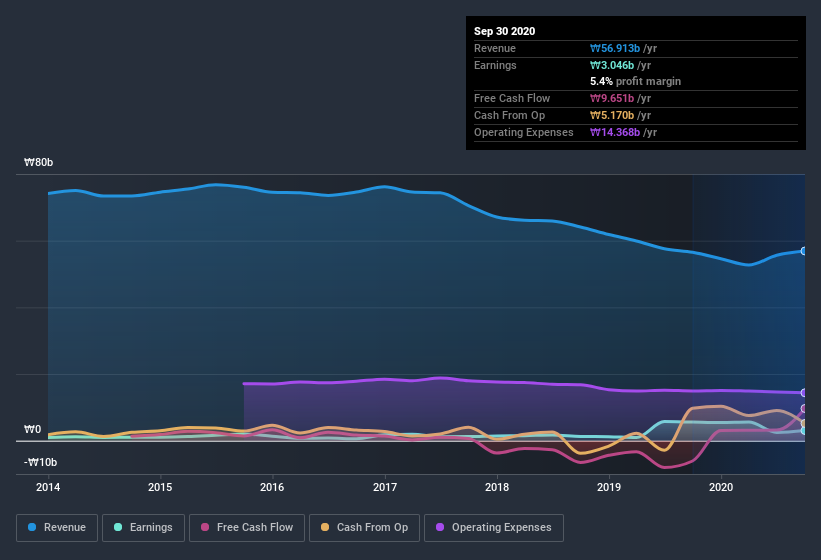- South Korea
- /
- Consumer Durables
- /
- KOSDAQ:A024940
Are PN Poong Nyun's (KOSDAQ:024940) Statutory Earnings A Good Guide To Its Underlying Profitability?
As a general rule, we think profitable companies are less risky than companies that lose money. That said, the current statutory profit is not always a good guide to a company's underlying profitability. This article will consider whether PN Poong Nyun's (KOSDAQ:024940) statutory profits are a good guide to its underlying earnings.
While PN Poong Nyun was able to generate revenue of ₩56.9b in the last twelve months, we think its profit result of ₩3.05b was more important. The chart below shows how profit has actually increased over the last three years, even while revenue has declined.
View our latest analysis for PN Poong Nyun

Of course, when it comes to statutory profit, the devil is often in the detail, and we can get a better sense for a company by diving deeper into the financial statements. As a result, today we're going to take a closer look at PN Poong Nyun's cashflow, and unusual items, with a view to understanding what these might tell us about its statutory profit. Note: we always recommend investors check balance sheet strength. Click here to be taken to our balance sheet analysis of PN Poong Nyun.
Zooming In On PN Poong Nyun's Earnings
As finance nerds would already know, the accrual ratio from cashflow is a key measure for assessing how well a company's free cash flow (FCF) matches its profit. In plain english, this ratio subtracts FCF from net profit, and divides that number by the company's average operating assets over that period. The ratio shows us how much a company's profit exceeds its FCF.
As a result, a negative accrual ratio is a positive for the company, and a positive accrual ratio is a negative. While having an accrual ratio above zero is of little concern, we do think it's worth noting when a company has a relatively high accrual ratio. To quote a 2014 paper by Lewellen and Resutek, "firms with higher accruals tend to be less profitable in the future".
Over the twelve months to September 2020, PN Poong Nyun recorded an accrual ratio of -0.21. Therefore, its statutory earnings were very significantly less than its free cashflow. To wit, it produced free cash flow of ₩9.7b during the period, dwarfing its reported profit of ₩3.05b. Notably, PN Poong Nyun had negative free cash flow last year, so the ₩9.7b it produced this year was a welcome improvement. However, that's not all there is to consider. We can see that unusual items have impacted its statutory profit, and therefore the accrual ratio.
The Impact Of Unusual Items On Profit
Surprisingly, given PN Poong Nyun's accrual ratio implied strong cash conversion, its paper profit was actually boosted by ₩7.4b in unusual items. We can't deny that higher profits generally leave us optimistic, but we'd prefer it if the profit were to be sustainable. When we analysed the vast majority of listed companies worldwide, we found that significant unusual items are often not repeated. Which is hardly surprising, given the name. PN Poong Nyun had a rather significant contribution from unusual items relative to its profit to September 2020. All else being equal, this would likely have the effect of making the statutory profit a poor guide to underlying earnings power.
Our Take On PN Poong Nyun's Profit Performance
PN Poong Nyun's profits got a boost from unusual items, which indicates they might not be sustained and yet its accrual ratio still indicated solid cash conversion, which is promising. Given the contrasting considerations, we don't have a strong view as to whether PN Poong Nyun's profits are an apt reflection of its underlying potential for profit. With this in mind, we wouldn't consider investing in a stock unless we had a thorough understanding of the risks. At Simply Wall St, we found 3 warning signs for PN Poong Nyun and we think they deserve your attention.
Our examination of PN Poong Nyun has focussed on certain factors that can make its earnings look better than they are. But there are plenty of other ways to inform your opinion of a company. Some people consider a high return on equity to be a good sign of a quality business. While it might take a little research on your behalf, you may find this free collection of companies boasting high return on equity, or this list of stocks that insiders are buying to be useful.
When trading PN Poong Nyun or any other investment, use the platform considered by many to be the Professional's Gateway to the Worlds Market, Interactive Brokers. You get the lowest-cost* trading on stocks, options, futures, forex, bonds and funds worldwide from a single integrated account. Promoted
New: Manage All Your Stock Portfolios in One Place
We've created the ultimate portfolio companion for stock investors, and it's free.
• Connect an unlimited number of Portfolios and see your total in one currency
• Be alerted to new Warning Signs or Risks via email or mobile
• Track the Fair Value of your stocks
This article by Simply Wall St is general in nature. It does not constitute a recommendation to buy or sell any stock, and does not take account of your objectives, or your financial situation. We aim to bring you long-term focused analysis driven by fundamental data. Note that our analysis may not factor in the latest price-sensitive company announcements or qualitative material. Simply Wall St has no position in any stocks mentioned.
*Interactive Brokers Rated Lowest Cost Broker by StockBrokers.com Annual Online Review 2020
Have feedback on this article? Concerned about the content? Get in touch with us directly. Alternatively, email editorial-team (at) simplywallst.com.
About KOSDAQ:A024940
PN Poong Nyun
Manufactures and sells kitchenware products in South Korea.
Flawless balance sheet with acceptable track record.
Market Insights
Community Narratives




